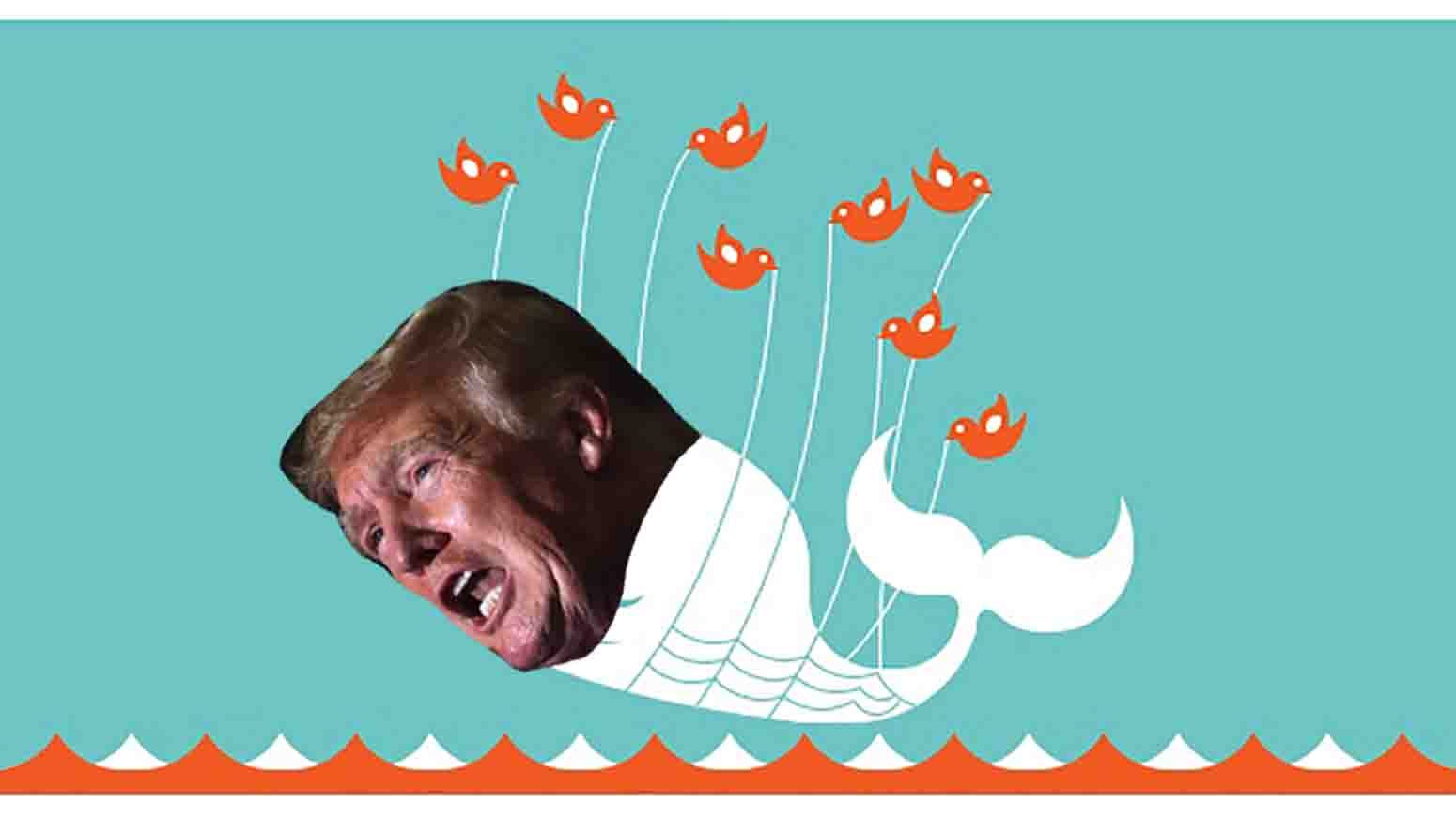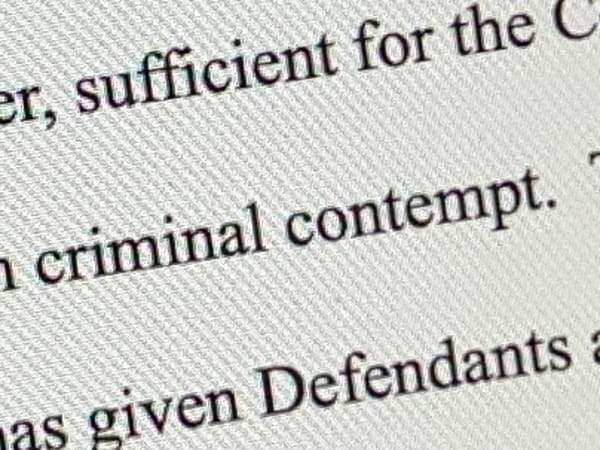Indignity Vol. 2, No. 39: Sad!
HEIGHTENED CONTRADICTIONS DEP'T.

Fine, Give Trump His Twitter Back
THIS IS A bad idea, but there don't seem to be very many good ideas around right now. So: Twitter needs to go ahead and give Donald Trump his account back.
I'd been thinking about suggesting this—and I'd been getting people to talk me out of suggesting it—for months and months, long before Elon Musk said he wants to restore Trump's account if or when he finished buying Twitter. Based on Musk's overall record, Musk's being in favor of it means the chances must be at least eight to one that it is the wrong thing to do.
Nevertheless, it's a wrong idea whose time has come—ideally, before Musk is the person in charge of doing it. Twitter would be better off if they did it before Musk takes over, or the rest of us would be better off.
I wouldn't want to do it, if I were Twitter. I'm glad I personally have no power to restore Donald Trump to Twitter and no responsibility for what would happen afterward. When Twitter finally did ban @realDonaldTrump, to stop him from whipping his followers into paranoid violence about his defeat in the election, only the most ghoulish media producers and consumers pretended to miss him. The day his tweets went away, it felt as if someone had abruptly stopped beating America over the head with a clanging metal pipe.
Within a few months of the ban, though, the silence stopped seeming like an unreserved blessing. Taking Trump off Twitter did not restore political life and discourse to normalcy; instead, it split American politics into two separate tracks, both of them profoundly abnormal. On one, Trump has continued to accelerate the Republican Party faster and faster toward an apocalyptic collision with the foundations of American electoral democracy. On the other, the Democratic Party and the mainstream political press are furtively glancing at the upcoming impact while they proclaim and pretend that things are basically fine, or that things could possibly work out fine, perhaps after some ordinary healthy setbacks in the midterm elections.
So here, according to ethics, would be where you throw the big guy out onto the rails and see if it makes a difference. What alternative would there be, at this point? Everyone has already tried hoping Trump would go away, or hoping someone else would make him go away.
It was always magical thinking. In the days after the January 6 attack on the Capitol, Mitch McConnell—then Senate majority leader, now minority leader—reportedly told people in private, "The Democrats are going to take care of that son of a bitch for us." Mitch McConnell! His entire triumphant political career had been built on consistently, successfully betting that the Democrats wouldn't take care of anything. Yet in the moment of crisis, that was all he could come up with.
For Democrats, denying the problem of Trump became a goal uniting the Democratic Party's otherwise hostile left and center. "I don't think about the former president," Joe Biden said last year, after the news broke that Trump had knowingly concealed a positive Covid test before their first presidential debate. Only some real or imagined cohort of cringey #Resistance liberals wanted to dwell on what happened between 2015 and 2020. The Democrats, the new thinking went, couldn't just keep running against Trump—with their narrow governing trifecta, the party needed to (depending on which wing was doing the arguing) either deliver major, substantive improvements in people's lives, or act responsible and reassuring.
It sounded fine, or even wise. It just didn't work. Deplatforming is an incredibly valuable and useful strategy against many or most kinds of awful people. I've gone months without having to think about that one formerly ubiquitous terrible guy, or that other guy who tried to be shocking, or years even, without remembering that other one. Take away the attention, and those run-of-the-mill creeps and goblins really do all but cease to exist.
When the creep controls a major political party, though, the calculation is different. Current events don't become bygone history just because most people would prefer to think about something else. Nearly a year and a half after Trump lost his Twitter account and the White House, in whichever order of importance, American politics is still defined around him—or even worse, around an empty space shaped like him. Under the banner of doing Trumpism without Trump, Tucker Carlson has led Fox News into ever more passionate white nationalism; out in Tennessee, the disembodied idea of Trump managed to transcend Trump's own actual endorsement, which was dismissed as insincere pandering to the Jews.
Meanwhile the actual Trump has brought McConnell and House minority leader Kevin McCarthy cringing to heel, forcing the latter to disown his own recorded comments from early 2020 about how Trump needed to go. The Republicans in Congress who objected to the Capitol attack have been purged on Trump's behalf, as have the various state and local election officials who declined to help him steal the election. Republican primary candidates are competing to see who can be the most Trumpishly belligerent and vicious, in the hopes of winning his endorsement—an endorsement apparently potent enough for Trump to swing the Ohio Senate nomination to ersatz mountain-baby J.D. Vance, without even bothering to get Vance's name straight.
With Trump in the background—a moving lump noisily stumbling around behind the rear curtain—and Trumpism in the foreground, the Republican Party is left in the bizarre position of simultaneously trying to seize absolute power over the country and to tear itself apart in shame and disgrace. The Republican establishment keeps telling reporters, off the record or on time delay, that they are privately disgusted with their ex-president, even as they commit themselves to no political agenda beyond helping to make him president again.
Democrats have responded to this mostly by talking about how they're focused on governing, and then failing to pass their own agenda. The messaging strategy they show the most commitment to is attacking activists adjacent to their party for having said "Defund the Police" two years ago, rather than attacking the other party for physically bludgeoning the police while trying to overturn the presidential election. The party seems almost to take comfort from the prospect of being wiped out in November, because historically the midterms tend to go against the incumbent president's party anyway, which would make the Democrats' weakness in the polls a sign that the normal and natural political dynamics of the country are coming back.
To the political press, too, it apparently feels like the ordinary flow of things. The president's approval ratings always sag once the administration runs into real-world problems—especially time-honored voter complaints like inflation and crime, or maybe the fear of crime. The mainstream media are reassured by living under a Democratic government that isn't accomplishing anything; it allows them to feel as if they aren't taking sides. The question of whether the Republican Party can successfully close ranks in defense of the violent rejection of constitutional democracy has devolved into the question of which party is winning the messaging-discipline game. Joe Biden has avoided placing himself at the center of a daily orgy of corruption, scandal, and abuse of power, yet his polls are as bad as Trump's were.
We are living through a protracted reprise of that strange interlude from the stretch run of the 2016 presidential race, after the Access Hollywood tape came out—when Trump's advisors, seeing him on the verge of being cut loose by mortified party officials and buried in a landslide, finally got him to shut up for a week or two. It was just long enough for the Republican Party to pull itself back together, and for the press, following its habit of balance, to go looking for Hillary Clinton scandals to cover. The Trump campaign went into that spell of silence wondering if its vice-presidential candidate might bail out and whether it might lose Texas; it came out of it positioned to win the presidency.
And so, with dread and regret, I've come around to believing what Trump himself so often said: that he alone can fix this. Our situation is monstrous. We need to see and hear the monster again.
During the Trump years—that is, the four or really five years when Trump was in the foreground—there was a true and accurate complaint that too many liberals wanted to treat him as a unique and unprecedented aberration, rather than a figure deeply rooted in our history and our political system. The real danger of Trump was always that he embodied social forces much larger and uglier than his own defective personality, and it was a mistake to imagine that getting rid of him would get rid of the problem.
Nevertheless, having the problem embodied helped clarify things. In an excellent and haunting 2020 essay, which I'm probably spoiling by quoting here, Wallace Shawn reflected on the collapse of the illusion of American benevolence, even for the people who'd been comfortable enough to believe in it before:
Over the decades of my life, America’s morale has declined, I’d say. There was a dignity to feeling kind and good. It was enjoyable. On the other hand, the lack of connection between what we felt we were and what we actually were was dangerous and led to the death of a lot of people...[F]or those countless others, in the cities and towns of the USA and in countries far away, to whom America has not been good, the face of America has always and forever been the face of Donald Trump.
It's been pleasant to live without Trump's constant presence, but we don't deserve that kind of pleasantness. The past year and a half, as much as the four years before it, has shown that America is incapable of positive political accomplishments. We live in a mean and stupid country, bent on its own destruction, and Donald Trump will tell us so—will shove that fact into our eyeballs and bray it into our ears, all day, every day.
Bringing @realDonaldTrump back will be miserable and dangerous. Last time around, his online presence gave the most noxious parts of the far right something to organize around, to validate their grievances to shape their paranoid and anti-democratic mythology. The Wall Street Journal's account of the behind-the-scenes effort to convince Musk to buy Twitter is a roll call of that era's worst personalties, up to and including a Holocaust denier. Trump's tweets will almost certainly give them what they want to see: witness tampering, lying, perfunctorily deniable exhortations to violence.
The temptation is to try to bargain for a little more peace, or the illusion of peace. Surely it would be better to hold off for another month or two, long enough for the House Jan. 6 committee—the only part of the Democratic government that seems to take the threat seriously—to lay out the case against Trump's insurrection to the public, without the man himself heckling from the sidelines. Maybe that will do what the Mueller report and the first impeachment and the second impeachment couldn't do, and wake up the nation to the scope of the disaster.
But no matter what, Trump will be coming back, to politics and to Twitter. The polls say so, the Republican agenda says so, and Elon Musk says so—repeatedly, and in the most annoying ways he can. One of the benefits of life without Trump's Twitter feed was that for a while, the country no longer had to drop everything and redirect the news cycle to attend to whatever wrong and destructive thing the almighty jackass had decided to tweet out that day or hour. With his bid to buy Twitter, though, Musk ruined that, by making himself the new national jackass.
If Twitter waits until Musk personally flips the switch, there will be no practical limit on whatever Trump chooses to tweet. Musk has made it clear that he has given the problems of content moderation and incitement precisely as much thought as he gave the problem of throughput before he went into the business of designing transit tunnels, which is to say none at all.
We might as well start dealing with the consequences of Trump's return now, before they're fully in the hands of a Twitter owner who doesn't believe consequences exist. The true effects, like those of any meaningful historical event, will only reveal themselves over the course of time, regardless. The 2016 Republican primary field and the Hillary Clinton campaign both thought that giving Trump more exposure would bring about his immediate downfall, and both were wrong.
Yet Trump was wrong about how much people wanted to hear from him, too. If Twitter was (after CNN) the platform where he did the most harm, it was also the platform where he did the most harm to himself. By 2020, the steady diet of Trump was enough to bring out 84 million people to the polls, desperate to end it.
At this point in 2022, with the Trump movement trying to take its revenge on the entire election system, that desperation may be all those voters have left—not a climate initiative, not a pandemic strategy, not a working social welfare program, not the Civil Rights Act or Roe v. Wade. Facing an existential threat against something much greater than the Democratic Party, the Democrats have been retreating into the habits that made Trump possible in the first place: hollow institutionalism, intra-party recriminations, self-sabotage along Republican attack lines.
As liberals and centrists dabble in anti-mask activism and crime scares, the left-of-center voting public finds itself in the paradoxical and demoralizing situation of seemingly caring more about whether the Democrats beat the Republicans than the Democratic Party does. Throughout Trump's presidency, the left complained that Trump was a bogeyman who allowed complacent Democrats to feel politically engaged without actually accomplishing anything. Now, he might be the only thing still capable of getting them to take the perils of this moment seriously.






